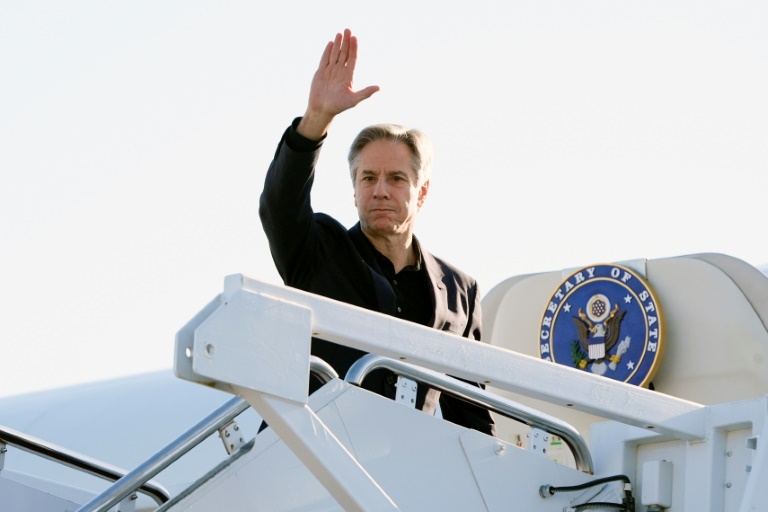Blinken due in China seeking pressure but also stability

US Secretary of State Antony Blinken waves as he boards his plane at Joint Base Andrews on his way to Beijing
Shanghai – US Secretary of State Antony Blinken was due in China on Wednesday as the United States ramps up pressure on its main rival over its support for Russia, while seeking to manage tensions between the two powers.
The US diplomat will meet China’s top brass on Friday in Beijing, where he is also expected to plead for continued restraint as Taiwan inaugurates a new leader and to raise US concerns on Chinese trade practices, a vital issue for President Joe Biden in an election year.
But Blinken is also in China in a bid to stabilise US ties with Beijing, with tensions between the world’s two largest economies palpably eased since his last visit in June.
That visit, which at the time was the highest-ranking to China by a US official in five years, was followed by a meeting between the countries’ presidents in November.
At the summit in California, Chinese President Xi Jinping agreed to a US wish list including restoring contact between militaries and cracking down on precursor chemicals to fentanyl, the powerful painkiller behind an addiction epidemic in the United States.
Blinken will start his visit on Wednesday in Shanghai.
He will meet students and business leaders in what an aide called a bid to highlight warm ties between the American and Chinese peoples.
The friendly side trip — the first visit by a US secretary of state to the bustling metropolis since Hillary Clinton in 2010 — would have been unthinkable until recently, with hawks on both sides previously speaking of a new cold war between the two powers.
Treasury Secretary Janet Yellen similarly toured the manufacturing hub of Guangzhou before visiting Beijing earlier this month.
A senior US official previewing Blinken’s trip said that the United States and China were at a “different place than we were a year ago, when the bilateral relationship was at an historic low point”.
“We also believe, and we have also clearly demonstrated, that responsibly managing competition does not mean we will pull back from measures to protect US national interests,” he said.
– Pressing on Russia –
The Biden administration’s eagerness to engage China stands in stark contrast to its efforts to isolate Russia since its invasion of Ukraine in February 2022.
After initially being pleased that Beijing has not directly supplied weapons to Russia, the United States in recent weeks has accused China of lavishing industrial material and technology on Moscow.
Washington has encouraged European leaders including German Chancellor Olaf Scholz, who recently visited Beijing, to stand firm on not backing Russia, believing that China wants stable ties with the West as it focuses on addressing economic headwinds at home.
“If China purports on the one hand to want good relations with Europe and other countries, it can’t on the other hand be fuelling what is the biggest threat to European security since the end of the Cold War,” Blinken said Friday after Group of Seven talks in Capri, Italy.
Biden has not shied away from other concerns, months ahead of an election rematch with Donald Trump, who has championed a tough line with China.
Biden this month accused China — a comparatively small exporter of steel to the United States — of “cheating” on the product and told union workers he would seek higher tariffs.
On the eve of flying to China, Blinken renewed accusations that Beijing is carrying out “genocide” against the mostly Muslim Uyghur minority.
That allegation, which Beijing rejects, was first raised by the Trump administration.
Yun Sun, a senior fellow at the Washington-based Stimson Center, said that China’s leaders, eager to focus on their economy, were in a wait-and-see mode ahead of the US election.
“The Chinese understand that the Biden administration is unlikely to deliver any good news on trade because that simply does not support the election agenda,” she said.
For Chinese leaders this year, “their priority is to keep the relationship stable”.
“Until there is clarity on who the next administration will be, I don’t think they see a better strategy,” she said.
